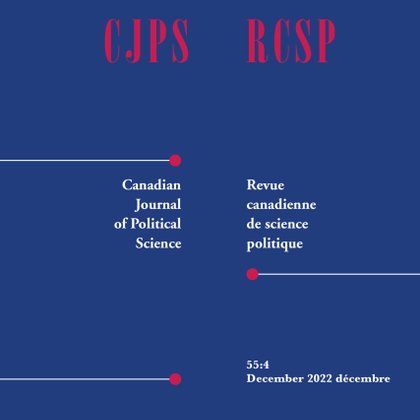
Lewis Krashinsky
@Lkrashinsky
Followers
353
Following
461
Media
13
Statuses
865
SSHRC Postdoctoral Fellow in Political Science @UofT. PhD from @Princeton, Fulbright Scholar.
Toronto, ON
Joined November 2010
How will the murder of #CharlieKirk change the future of American politics? @UofT_PolSci Postdoctoral Fellow @Lkrashinsky comments @YourMorning. https://t.co/sgaBazhTzV
0
2
4
#Alberta by-election: @SSHRC_CRSH Postdoctoral Fellow @UofT_PolSci @Lkrashinsky discusses #pierrepoilievre who touts his win as a sign of his political resilience @CityNewsTO. https://t.co/ftaor138HV
0
1
4
Had a lot of fun speaking to @carynceolin this morning on @breakfasttv We talk about last night's byelection in Battle River - Crowfoot, what happened and what comes next for the Conservative Party and Pierre Poilievre: https://t.co/RgE0qXnBkS
0
2
6
#OpenAccess from @CJPS_RCSP - How Canada Compares: The Politics of White Identity, Racial Resentment, and Racial Attitudes in North America - https://t.co/zPJHzPU2RF - @Lkrashinsky
#FirstView
0
3
5
Open Access to the full article here: https://t.co/nLj7QKsyMU
0
0
2
Over 35 per cent of white Canadians believe that Black Canadians do not deserve any special favours from government. White Canadians with higher levels of racial resentment or white identity are more likely to penalize nonwhite candidates, and are more likely to vote Conservative
1
0
1
But race is far from an irrelevant factor in Canadian politics. White identity and racial resentment are meaningful constructs for white Canadians. Over 20 per cent of white Canadians strongly identified with their racial group.
1
0
1
In sum, race continues to be of greater political importance in the United States than in Canada. White Americans are more racially resentful and identify more strongly with their racial group than white Canadians.
1
0
1
Third, white racial identity and racial resentment are strongly correlated with voting for and identifying with right-wing parties in both Canada and the United States. However, the magnitude of the effects is consistently larger among white Americans.
1
0
1
Second, the presence of nonwhite political candidates triggers stronger electoral backlash from white Americans. Nonwhite candidates receive a lower average vote share among white Americans. Yet for white Canadians, there is no average electoral penalty for nonwhite candidates.
1
0
1
First, white Canadians consistently express lower levels of white identity and racial resentment than white Americans. But these differences evaporate on measures of racial affect with feeling thermometer scores.
1
0
1
Utilizing survey data and a candidate-choice conjoint experiment, I directly compare white racial identity, racial resentment and racial affect between samples of white Americans and white Canadians. To summarize the findings (and make the publisher mad at me):
1
0
1
It has long been argued that American politics is group centric, and that race is the defining cleavage separating groups of individuals. Yet, Canadian political science has generally avoided much accounting for the importance of race in the country’s politics.
1
0
2
*New research paper just published at the Canadian Journal of Political Science* To what extent do racial attitudes and white identity matter in Canadian electoral politics? And how might this compare to the United States? https://t.co/nLj7QKsyMU
cambridge.org
How Canada Compares: The Politics of White Identity, Racial Resentment, and Racial Attitudes in North America - Volume 58 Issue 3
1
0
4
The majority of these people are not motivated to enter politics out of a sense of loyalty to a given party, but out of a sense of general duty to the public good. Young people who are more self-interested are much less likely to want to work in politics.
0
0
2
We conclude that, above all else, the young people who desire to work as political staffers are motivated to help the public. They are altruistic, change-seekers, and/or motivated to represent the underrepresented.
1
0
2
Just as how we should be concerned with why politicians run for public office, we should also be interested in what motivates staffers to undertake their work.
1
0
1
Are young people trying to make a positive difference by serving the public interest, or are young people choosing to work in politics to serve their own interests?
1
0
1
In a new article at Canadian Public Administration, we use this data to ask a number of important questions: Are young people who want to become political staffers also the people who we should hope to want the job?
1
0
1
Due to the inevitability of post-hoc justifications, you cannot understand the motivations for pursuing a job by interviewing people already doing that job. So, we did something different, surveying a group of potential future staffers: undergrad political science students.
1
0
0


